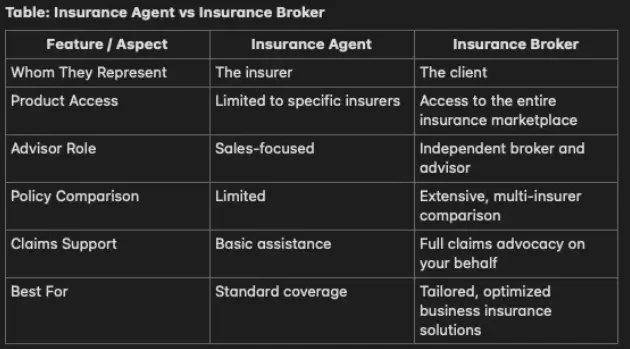In today’s complex insurance marketplace, businesses face countless options, confusing policy wording, and unpredictable risks. This is where an insurance broker becomes more than a service provider— they become your strategic partner. Rather than representing one insurer, brokers act as independent advisors, guiding you through risk analysis, policy selection, and claims processes while ensuring your coverage aligns with your long-term objectives. With deep industry understanding, brokers work as a risk management advisor, helping businesses make informed decisions that reduce exposure and improve financial resilience.
Whether you operate a small enterprise or a multinational company, partnering with the right broker can significantly improve your coverage analysis, secure better policy terms, and streamline policy placement. This article breaks down everything you need to know from the broker’s role and benefits to the differences between an insurance agent vs broker, and how to select a professional you can trust.
The Role of an Insurance Broker: Your Advocate in the Market
An insurance broker serves as your representative not the insurer’s. Their primary responsibility is to help you understand your risks, design tailored solutions, and negotiate terms with insurers on your behalf. Unlike agents, who are often tied to a specific insurer, brokers have access to a wider network of commercial insurance providers, enabling them to offer more competitive options.
Key responsibilities include:
- Risk assessment: Understanding your business model, exposures, and needs.
- Insurance consulting: Advising on the right coverage types and limits.
- Policy placement: Sourcing and negotiating policies from multiple insurers.
- Underwriting coordination: Communicating with underwriters to secure better terms and pricing.
- Claims advocacy: Guiding you through the claims process to maximize your accepted claim value.
By acting as a risk advisor, brokers bridge the gap between you and insurers, ensuring clarity, transparency, and optimal coverage.

Broker vs. Agent: Understanding the Crucial Difference
Choosing between an insurance agent and an insurance broker often causes confusion. Here is the core difference:

Agents usually work for an insurer to sell their products, while brokers work for you to find the best possible coverage and manage risks comprehensively.

The Tangible Benefits of Partnering with an Insurance Broker
Working with an insurance broker provides measurable advantages that go beyond simple policy purchase:
- Access to multiple insurers
Because brokers are independent, you receive a wider selection of products, more competitive premiums, and better coverage options. - Tailored risk management
A broker assesses your risks in detail and offers solutions aligned with your business operations—not generic recommendations. - Better policy wording and terms
Skilled brokers negotiate improved conditions, exclusions, and pricing by working closely with underwriters. - Claims advocacy
If a loss occurs, your broker represents your interests, ensuring a smoother claims process and increasing the likelihood of faster resolution. - Ongoing policy review
Your business evolves, and so do your risks. Brokers offer continuous policy review and coverage updates to keep you protected over time. - Strategic insights
Leveraging broad market knowledge, brokers provide insights into trends, insurer capacities, and emerging risk exposures.
How to Choose the Right Insurance Broker for Your Business
Not all insurance brokers offer the same level of service. Here are practical steps to ensure you select the right one:
Look for a Consultant, Not Just a Salesperson
A strong insurance broker acts as a risk management advisor, not merely a policy seller. Look for someone who takes time to understand your business, risk appetite, and financial goals. A broker who prioritizes strategy over sales delivers long-term value through tailored coverage and expert guidance.
Verify Their Specializations and Experience
Every industry faces unique risks. Ensure your broker has experience in your specific sector manufacturing, healthcare, tech, logistics, or professional services. Specialized brokers understand industry-standard coverage, regulatory requirements, and common claim scenarios, enabling them to provide deeper insurance consulting and more effective solutions.
Understand Their Claims Process
A broker's support truly matters when a claim occurs. Ask these questions:
- Do they provide active claims advocacy?
- Who will manage your claim—an in-house specialist or the broker?
- How quickly do they respond during emergencies?
- What is their success rate with claims negotiation?
A transparent claims process indicates a broker committed to protecting your business when it matters most.
Frequently Asked Questions (FAQs)
How are insurance brokers paid?
Insurance brokers typically receive commissions from insurers based on the policies they place. Some may charge service fees for consulting or extended risk advisory work. Brokers must always disclose compensation details to maintain transparency.
Will my insurance premium be more expensive if I use a broker?
Not necessarily. Brokers often secure better coverage analysis, improved terms, and more competitive pricing due to their access to multiple insurers. In many cases, using a broker reduces your long-term costs by preventing underinsurance or coverage gaps.
Can a single broker handle all my business insurance needs?
Yes. Many brokers specialize in a wide range of commercial insurance, including liability, property, employee benefits, cyber insurance, and industry-specific risk coverage. A full-service broker streamlines your risk management and policy administration under one relationship.
What is the broker's role when I have to make a claim?
Your broker provides claims advocacy, helping you prepare documentation, negotiate with insurers, and ensure fast, fair settlement. They represent your interests not the insurer’s throughout the entire process.

